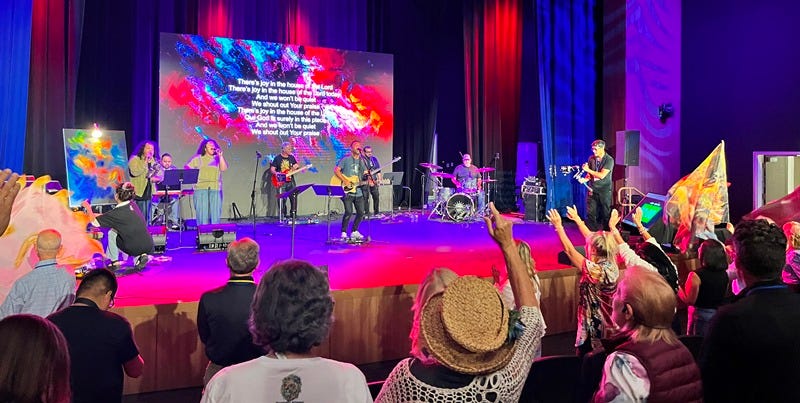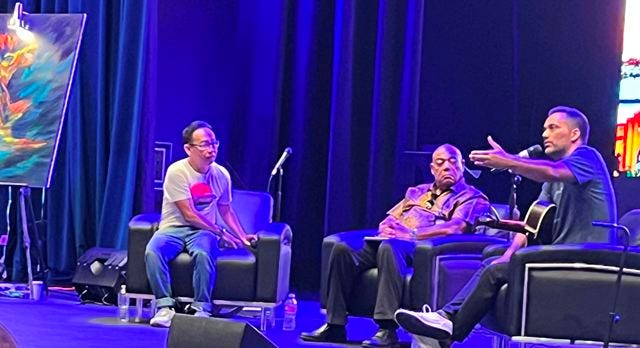TA-DAH! Worship in Heaven
A Panel of Those-in-the-Know at Heaven Encounters 2025
One of the many highlights of Heaven Encounters 2025 was the panel on Worship in Heaven with Heaven-Visitor Dean Braxton, Worship Leader Andrew Hopkins, and Moderator Johnson Doan. Continue reading for my experiences, the insights I've gained from my Lord's words, and the perspectives shared by the panel.
In John 4:21–24, Jesus reveals that true worship isn’t about where or how people gather, but about hearts aligned with God’s Spirit and truth. It’s worship that flows from genuine relationship, not rote ritual.
The word “worship” in those verses (προσκυνέω proskyneō) means: to worship, pay homage, show reverence; to kneel down (before); fall down, fall on knees in front of in reverence; paying homage.
(I also note that the passage above begins with “Woman”, a term Jesus often uses that miffed me for a long time. Although He is speaking to a gal here, it can vibe as derogatory, and I know I am not the only woman to feel this way. But because I know my Lord’s heart and understand now that He is never a woman-scoffer, I replace those in my head as I read with “beloved.”)
Worship Beyond the Song
Worship was never meant to be confined to a melody. The truest form of worship is a life surrendered to God. One that reflects His love, truth, and mercy in every word and action. We are called to offer our bodies as living sacrifices (Romans 12:1), reminding us that worship often begins where the music ends — in obedience, service, and everyday choices honoring Him.
However, singing and making music with our instruments is beautiful and powerful, creating unique allure and (I would argue) power. There will be a chapter on that in my upcoming Heaven book. It remains vital not just here, but in Heaven. In fact, our Lord says it is how we are to enter both the Gates and Courts of the Lord. “Enter his gates with thanksgiving and his courts with praise; give thanks to him and praise his name.” (Psalm 100:4)
God desires harmony between our lips, limbs, and lives. It’s pretty hard to worship Him with genuineness if we aren’t in the same boat as He. Andrew says, “True worshipers are honest, not perfect…It is authenticity. Singing with our hearts... Worship is always a response to revelation.”
“We are called to worship,” Dean explains. “When I was in Heaven, we were called to His throne to share our love with Him. But it was not a group announcement. We were each personally called.”
If you only sing from your head, you will only minister to heads.
-Andrew Hopkins, Worship Leader
Johnson Doan, Dean Braxton and Andrew Hopkins
The Posture of Praise
John 4:23-24 says, “Yet a time is coming and has now come when the true worshipers will worship the Father in the Spirit and in truth, for they are the kind of worshipers the Father seeks. God is spirit, and his worshipers must worship in the Spirit and in truth.”
During this significant moment, Jesus shifts worship from being about a physical place (v. 21- temple or mountain) to a spiritual posture — authentic worship from the heart, aligned with God’s truth. “The worship in spirit and truth indicates to me that it is not flesh-motivated at all,” Andrew agrees. “It’s strictly a heart posture. In Psalm 22:3, we learn that God inhabits the praise of His people.”
The Hebrew word there for inhabits (יֹשֵׁב -yoshev for present tense) can mean to sit, dwell, or remain. So God dwells or is enthroned among the praises of His people — worship creates a space where His presence is welcome and evident. David paints a beautiful truth in Psalm 22. When God’s people praise Him, His presence rests or dwells there. Praise becomes a kind of throne for His presence. It’s not that He needs our praise, but that worship creates space for His holiness to be experienced.
This is a truth I can attest to, as I often feel the presence of the Holy Spirit in worship. And one evening at the conference, the entire assembly felt the pressing weight of the Holy Spirit. Beautiful, overflowing, heart-full, synergy-packed moments. He has given me a few instances of this since I returned from Heaven, and this became a very memorable chapter. It brought me closer to Heaven. Someday, I will feel that way forever! Woot!
In the Old Testament, His presence rested among worshipers. In the New Testament, He hits a homerun and wins the game because we become His dwelling place (1 Corinthians 3:16). Read that again: He dwells in us. How magnificent and powerful is that! Like describing my time in Heaven (Twice now! More on that later), words fail.
Even the Words Shout
Dean shared that the Hebrew word for thanksgiving is תּוֹדָה (tôḏâ - pronounced to-daw’!). Strong’s pitches it as “thanksgiving, praise, or confession”. It is very close to our English “Ta-Dah”, which means an imitation of fanfare; used to call attention to an impressive entrance. It appears approximately 32 times in the Hebrew Bible (Old Testament), most commonly in Psalms, Leviticus, and Jeremiah. 1
Dean told us that the Hebrew word יָדָה (yāḏâ - pronounced Yah-Dah!) also means praise. Although both Strong’s and Bible Hub back this up, a friend in Israel says that the original yada meant to throw a stone or spear. This meaning is also listed in Bible Hub—and I would wonder if it perhaps became “slang” for throwing praise.
Interesting!
Let us gleefully say: “Ta-Dah! Ya-Dah!” as a way of “throwing praise to Him.” As you can imagine, a few of us were running around calling that out for the rest of the conference.
Worship on Earth Reaches the Heavens
Some have mentioned that while in Heaven, you can see prayer-rays beam from earth, but did you know our praise and worship also reach Heaven? Dean shares, “Anytime earth worshiped when I was there, Heaven worshiped too. Even when humans were just practicing. When it happens, everything there pays attention.”
There were no words in Heaven while he was there, Dean shared. Only song. “He may have sung the earth into existence. Everything there is song. In Genesis 3:8, it says they heard the ‘sound of Him in the garden, and hid.’” Indeed, the word sound (qôl) used in the verse means: sound; voice; proclamation; crying; shouts of joy; music; singing.
Our Lord may have been singing or calling Adam and Eve.
But knowing Him a bit deeper now, I would wonder if He was grief-crying over their actions.
What we can be sure of is this—they did not hear Him step on sticks, push through underbrush, or stomp plants because the word used instead would have likely been “tza’adei be’akvot”, “kol tza’adim”, or “na’aseh ra’ash im tza’adim” (sound of steps). Or possibly “tzo’ad drach hasbach” (stepping through underbrush). They heard his voice in some form.
Many other Heaven-visit accounts also describe constant song and praise. I think it’s highly possible that because everything, including the flowers and blades of grass, praise God, it becomes the focal point (outside of our Lord, Himself).
For excellent, ear-filling reasons.
TA-Dah!
“Worship is expressive and has health benefits, even. A single person expressively worshiping is louder than a stadium full.” -Johnson Doan, Moderator
Andrew’s Heaven Encounters Song
Yes, this talented and prolific musician wrote a song just for us at Heaven Encounters, and I love it!!! It expresses a desire for eternity and our longing for Jesus. I added it to my Heaven Playlist on YouTube, and it currently holds the honored spot of being last on the list, so it can linger in your brain. Do me a favor? Please listen to it and give his song (and the playlist) a thumbs up. That helps it reach more people. Comments help too! Thank you, friends!
Some Verses About Worship
“For where two or three gather in my name, there am I with them.” Matthew 18:20 (NIV)
“Don’t you know that you yourselves are God’s temple and that God’s Spirit dwells in your midst?” 1 Corinthians 3:16 (NIV)
“And in him you too are being built together to become a dwelling in which God lives by his Spirit.” Ephesians 2:22 (NIV)
“Therefore, I urge you, brothers and sisters, in view of God’s mercy, to offer your bodies as a living sacrifice, holy and pleasing to God—this is your true and proper worship.” Romans 12:1 (NIV)
More About Dean Braxton and Andrew Hopkins:
Dean Braxton, once dead for an hour and forty-five minutes, is a licensed minister in ministry for over 20 years. He has been happily married to Marilyn for over 30 years. He is the author of “Deep Worship in Heaven.”
Andrew Hopkins is a revivalist, prophetic worship leader, author, and revelatory preacher and teacher. He has a passion for the gospel, equipping the saints, and seeing God move in supernatural ways. He is an anointed songwriter. (Julie attests!)
P.S. - Hebrew/Bible scholars or those in the know, please correct me as needed. I apparently need to add a Hebrew degree to my to-do list. :-)
Verses in the Psalms
Psalm 26:7 – “proclaiming aloud your praise and telling of all your wonderful deeds.”
Psalm 42:4 – “...with shouts of joy and praise among the festive throng.”
Psalm 50:14 – “Sacrifice thank offerings to God, fulfill your vows to the Most High.”
Psalm 50:23 – “Those who sacrifice thank offerings honor me…”
Psalm 56:12 (Hebrew 56:13) – “I am under vows to you, my God; I will present my thank offerings to you.”
Psalm 69:30 – “I will praise God’s name in song and glorify him with thanksgiving.”
Psalm 95:2 – “Let us come before him with thanksgiving and extol him with music and song.”
Psalm 100:4 – “Enter his gates with thanksgiving and his courts with praise…”
Psalm 107:22 – “Let them sacrifice thank offerings and tell of his works with songs of joy.”
Psalm 116:17 – “I will sacrifice a thank offering to you and call on the name of the Lord.”
Psalm 147:7 – “Sing to the Lord with grateful praise; make music to our God on the harp.”
Verses in Leviticus
Leviticus 7:12 – “If they offer it as an expression of thankfulness, then along with this thank offering…”
Leviticus 7:13, 15 – More regulations on todah offerings (bread and when to eat it).
Verses in Jeremiah
Jeremiah 17:26 – “...bringing thank offerings to the house of the Lord.”
Jeremiah 33:11 – “...the voices of those who bring thank offerings to the house of the Lord, saying, ‘Give thanks to the Lord Almighty, for the Lord is good; his love endures forever.’”
Other Appearances
2 Chronicles 29:31 – “Then Hezekiah said, ‘You have now dedicated yourselves to the Lord. Come and bring sacrifices and thank offerings to the temple of the Lord.’”
Nehemiah 12:27, 31, 38, 40 – Describing the choirs of thanksgiving at Jerusalem’s wall dedication.
Amos 4:5 – “Burn leavened bread as a thank offering and brag about your freewill offerings—boast about them, you Israelites…”






Great read! John 4:24 was instrumental in my trusting Christ.
Wow! Amazing view of how worship affects heaven!!